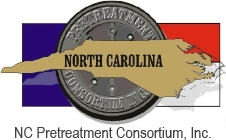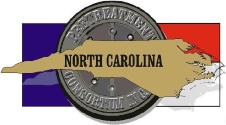NC-PC Pretreatment Certification Program
NC-PC Pretreatment Certification Program
The North Carolina Pretreatment Consortium, Inc., an assembly of industrial pretreatment professionals from local government across the State, have created a training and certification program for industrial pretreatment coordinators and administrators. The training program being offered by the North Carolina Pretreatment Consortium is based on a mature and successful program in Florida.
-
NC Pretreatment Consortium Certification Board
Chair
Bill Gintert
Charlotte Water
(704) 336-4636Grade 1
Sheryl Haig – Charlotte Water
Carrie Hyler – City of High PointGrade 2
Karen Reece – Town of Boone
Debra Batten – Town of Holly SpringsGrade 3
Martie Groome – City of Greensboro
Dawn Padgett – Charlotte Water/Union County
Amy Varinoski – City of Mebane
JoEllen Gay – Greenville Utilities Commission -
Certification Board Bylaws
May 15, 2003
Article 1: Name and Objectives
This organization shall be known as the Pretreatment Certification Board, a standing committee of the North Carolina Pretreatment Consortium, Inc (NC-PC). The Pretreatment Certification Board shall be known hereafter as “Certification Board”.
The objectives of the Certification Board shall be:
- To promote professionalism and ongoing education in the field of pretreatment.
- To provide an opportunity for professional certification for members of the NC-PC and other qualified applicants.
Article 2: Foundation
The North Carolina Pretreatment Certification Program administered by the Certification Board is based upon the program authored and administered by The Florida Water & Pollution Control Operators Association (FW&PCOA). In 2000, the NC-PC entered into a binding agreement with the FW&PCOA granting the rights to use the training manuals and written examinations created by the FW&PCOA in a North Carolina-based certification program. In accordance with this binding agreement, the founding members of the Certification board had to agree:
- To complete and pass the Florida Class C, B and A Industrial Pretreatment Specialist certification classes.
- To modify the training manuals and written examination materials to reflect the differing regulatory issues that govern the North Carolina Pretreatment Program.
- To award credit to the original authors of the written materials.
- To refrain from personally or individually seeking pretreatment certification in North Carolina.
Article 3: Board Members and Chairman
Membership on the Certification Board is by invitation and is permanent until such time as a board member retires, resigns or is removed by unanimous consent of the remaining board members. The Chairman of the board is selected by majority consent of the board. The Chairman shall hold said position until such time as he or she retires, resigns, or is removed by unanimous consent of the remaining board members.
The founding Board Members are as follows:
- Sherry Bagwell, City of Winston-Salem, Chairman
- Cheryl Douglas, City of Salisbury
- Martie Groome, City of Greensboro
- Sharon Miller, City of Greensboro
- Dawn Padgett, Charlotte Mecklenburg Utilities
- Ulysses Watkins, Charlotte Mecklenburg Utilities
Article 4: Restricted Activities
No part of the funds of the Certification Board shall be distributed to the members of the board, except that the board shall be authorized and empowered to pay reasonable compensation for goods and services rendered in the preparation and execution of the Certification Program.
Pretreatment Certification shall not undertake any activities that exempt the NC-PC from Federal Income Tax under Section 501(c) of the Internal Revenue Code of 1986 (or the correspondence provision of any future United States Internal Revenue Law). Nor shall the Certification Board undertake any activities that are not in accordance with the bylaws of the NC-PC.
Article 5: Funds
The funds for operation of the Pretreatment Certification Program shall be recovered from application fees. The Pretreatment Certification Program shall be self-supporting.
Each calendar year the Certification Board shall contribute $1,000 from the proceeds of the Pretreatment Certification Program, or the amount set by the NC-PC Executive Committee, to the general funds of the NC-PC to assist in payment of insurance and/or other expenses as deemed appropriate and necessary by the NC-PC Executive Committee.
-
Grade 1 Certification
The topics included in the Grade 1 Certification class and manual are listed below.
Manual Dedication: The Grade 1 Manual is dedicated to those authors in Florida that had the inspiration, the wisdom, and the will to develop a Pretreatment Certification Program. Without their dedication this certification would have been impossible for North Carolina. We are truly thankful to follow in your steps.
Grade 1 — 2025 Edition
Chapter 1 & 2 – Program History & Communication
Chapter 3 – Safety Awareness
Chapter 4 – Wastewater Collections
Chapter 5 – Wastewater Treatment
Chapter 6 – Significant Industrial Users
Chapter 7 – Sampling & Monitoring
Chapter 8 – Flow Monitoring & Sampling Equipment
Chapter 9 – Troubleshooting
Chapter 10 – Sampling Practical -
Grade 2 Certification
The following topics are included in the Grade 2 Certification class and manual.
Grade 2 – 2025 Edition
Chapter 1 – Rules and Regulations
Chapter 2 – Industrial Waste Survey
Chapter 3 – Industrial Pretreatment Processes
Chapter 4 – Inspection Procedures
Chapter 5 – Categorical Regulations/Standards
Chapter 6 – The Permitting Process
Chapter 7 – Data Review, Verification, and Interpretation
Chapter 8 – Compliance Judgement
Chapter 9 – Reference Material -
Grade 3 Certification
The following topics are included in the Grade 3 Certification class and manual.
Grade 3 – 2025 Edition
Chapter 1 – Pretreatment Program Administration
Chapter 2 – Sewer Use Ordinance Development
Chapter 3 – Multijurisdictional Agreements
Chapter 4 – Advanced Categorical Pretreatment Standards
Chapter 5 – Hazardous Waste & RCRA
Chapter 6 – Pretreatment Special Topics
Chapter 7 – Headworks Analysis and Local Limits Development
Chapter 8 – Enforcement Procedures & ERP
Chapter 9 – Pretreatment Annual Report (PAR)

